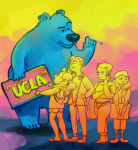UCLA should be a place that all students can call home. Too bad there’s a price on that now.
Student organizations on campus often like to recognize themselves as part of UCLA, be that through club T-shirts, hats or other accessories. What many don’t know is that the university charges these student groups royalties to use the UCLA name or logo on merchandise.
In the past, UCLA used to waive a majority of these fees for student groups. Since January, student groups must pay a licensing fee to the university if they want to use the UCLA name or logo on any merchandise.
This is a classic example of the university’s economic interests superseding student experience. Charging student groups licensing fees risks alienating the very students that form UCLA’s identity by placing a cost on associating themselves with the university. In order to continue to support the vibrant student community on campus, UCLA should waive its noncommercial trademark licensing fees for registered student organizations.
Cynthia Holmes, director of UCLA Trademarks and Licensing, said the university only authorizes certain manufacturers to produce merchandise with UCLA’s name and logos. UCLA charges these manufacturers for printing any design using its name, logos or intellectual property, and these additional costs are likely reflected in the manufacturers’ prices.
That is to say, if a club on campus were to order T-shirts with UCLA’s intellectual property on them, it would have to go through one of the authorized manufacturers, who would almost certainly pass on licensing costs to the club. Attempting to go through a manufacturer not licensed by UCLA would be an infringement of UCLA’s trademark.
Holmes added UCLA charges different royalty rates for organizations attempting to use UCLA’s name or other intellectual property on merchandise depending on its purpose. UCLA charges a royalty rate of 15 percent of the total merchandise cost for products intended for resale and other commercial purposes. For merchandise intended for internal use rather than resale, the royalty rate is reduced to six percent. Student organizations intending to provide merchandise to their members would fall under the latter category.
While six percent seems like a small amount, it’s no laughing matter. Student groups make up a vital part of UCLA’s campus community. Charging these groups just for the ability to proudly identify themselves as members of this community sends the message that their contribution is second to the university’s economic interests.
T-shirts and other merchandise are one of the primary ways campus clubs craft their unique identity and culture. Charging student groups to use the UCLA name on merchandise forces their members to incur additional costs in order to purchase these items. Certainly, large student organizations may have access to alternative funding sources or be able to place large bulk orders, allowing them to offset additional costs when ordering branded merchandise. But many smaller student groups don’t have these resources because they can’t necessarily use bulk-order discounts. Royalty fees make merchandise even more expensive, which in turn makes it more difficult for student groups to market themselves.
It is also important to note that student groups may not know they are being charged these royalties. UCLA charges licensing fees directly to the manufacturer, not the organization ordering the product. It is then the responsibility of the manufacturer to cover these additional costs. They could simply absorb these additional costs into the pricing for the shirts, and student organizations would be none the wiser.
The university used to waive most of these fees for student groups, though. Holmes said it no longer waives fees because it has to shoulder new costs to ensure its manufacturers abide by the University of California’s code of conduct for ethical labor practices. Because most of the university’s approved manufacturers tend to outsource the bulk of the manufacturing process, the university has helped them investigate their supply chains to verify whether all steps comply with the code of conduct. The university now enforces the six percent royalty across the board (without waivers for student groups) to offset the expense of investigating supply chains.
“By applying a reduced (six percent) royalty rate across the board, we hope to capture some of our cost,” Holmes said. “It’s really kind of sharing the cost of the due diligence in supply.”
While it is certainly admirable that UCLA is doing its due diligence to ensure that any merchandise bearing its intellectual property is produced using ethical labor standards, student groups should not bear the costs associated with this effort. Students are already paying record prices for tuition and books, and student fees are set to rise again next year. It adds insult to injury to charge them to identify their organizations as part of the UCLA community.
Instead, UCLA should waive royalty rates entirely for registered student organizations. It shouldn’t fall to students to shoulder the university’s additional costs. The university should look to other revenue sources to cover these costs, such as marginally raising the royalty rate for commercial merchandise or passing on the costs to manufacturers by requiring them to investigate their own supply chains.
Student organizations are the lifeblood of UCLA’s campus. Identifying themselves as such shouldn’t come at a price, regardless of what the university uses those fees for. Proclaiming yourself a Bruin shouldn’t come with a price tag.
